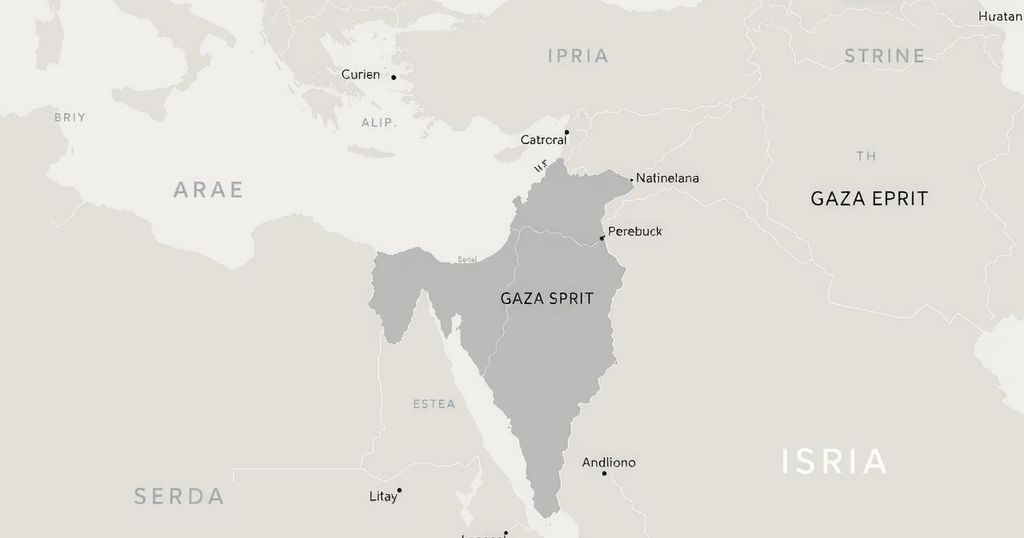President Trump proposed creating a “freedom zone” in Gaza during his Qatar visit, amid increasing Israeli airstrikes causing over 150 deaths in a day. The humanitarian situation grows dire, with over 53,000 Palestinian deaths reported. Ceasefire talks remain stalled, with focus shifting towards economic investments instead of immediate peace solutions.
President Trump announced a plan to establish a “freedom zone” in the Gaza Strip during his visit to Qatar, as ceasefire negotiations encounter significant delays. This comes in light of Israel’s ongoing offensive which has resulted in extensive casualties, with over 150 deaths reported in just one day, many of them children. Trump’s controversial idea seeks to displace Palestinians from Gaza and repurpose the territory as a lucrative real estate site, a proposal welcomed by Israel’s far-right government but condemned by Arab nations and Hamas as ethnic cleansing.
While Trump did not specifically address the ongoing war in Gaza until his informal press remarks, he characterized the situation as dire. He stated, “Gaza has been a territory of death and destruction for many years,” urging for U.S. intervention to realize his vision of a freedom zone. His remarks coincide with troubling statistics from Gaza’s health ministry, which indicate that more than 53,000 Palestinians—one-third of whom are children—have died since the conflict escalated.
Additionally, the recent release of U.S.-Israeli hostage Edan Alexander by Hamas raised hopes of a potential ceasefire, however, no tangible progress has been noted in discussions. Israeli negotiators are in Qatar this week, and Trump’s Mideast Envoy, Steve Witkoff, recently visited Israel, yet the talks remain stalled. The discussions prior to Alexander’s release involved direct dialogues between Hamas and the U.S., bypassing Israeli Prime Minister Benjamin Netanyahu, who faces rising pressure to broker deals for hostage releases.
Netanyahu maintains an approach seeking a temporary truce while planning further military action to incapacitate Hamas. Leaders from Saudi Arabia and Qatar voiced their concerns for peace in Gaza during Trump’s visit, yet Israeli military operations continue unabated. The Israeli government has called up reservist soldiers for anticipated offensives, while implementing a U.S.-backed initiative to distribute food to displaced individuals in Gaza—an effort which international aid groups criticize as detrimental to the humanitarian situation.
Israeli forces have enforced a blockade on Gaza for over two months, restricting vital supplies of food and medicine, pushing many to the brink of famine according to independent experts. This blockade has drawn harsh international condemnation, highlighting the urgency of the humanitarian crisis.
Throughout his Gulf tour, Trump has largely steered discussions away from the humanitarian disaster, instead focusing on economic partnerships. He discussed significant investment agreements, including a deal with Qatar for up to 210 Boeing aircraft and other agreements in technology and defense with Saudi Arabia. In a rally-style address to U.S. troops at Al-Udeid Air Base, he reiterated false claims that he won the 2020 election, while painting his administration as committed to empowering the military without regard for political correctness.
Thus, while humanitarian concerns intensify, the focus of the administration remains on bolstering economic ties.
In summary, President Trump’s recent remarks on establishing a “freedom zone” in Gaza have stirred significant controversy as Israeli airstrikes escalate, resulting in rising casualties among Palestinians. His visit underscores a focus on economic partnerships, overshadowing urgent humanitarian crises arising from the Israeli blockade and ongoing military offensives. The stalling of ceasefire negotiations amid discussions highlights tensions within the region, complicating peace efforts.
Original Source: www.wxxinews.org






